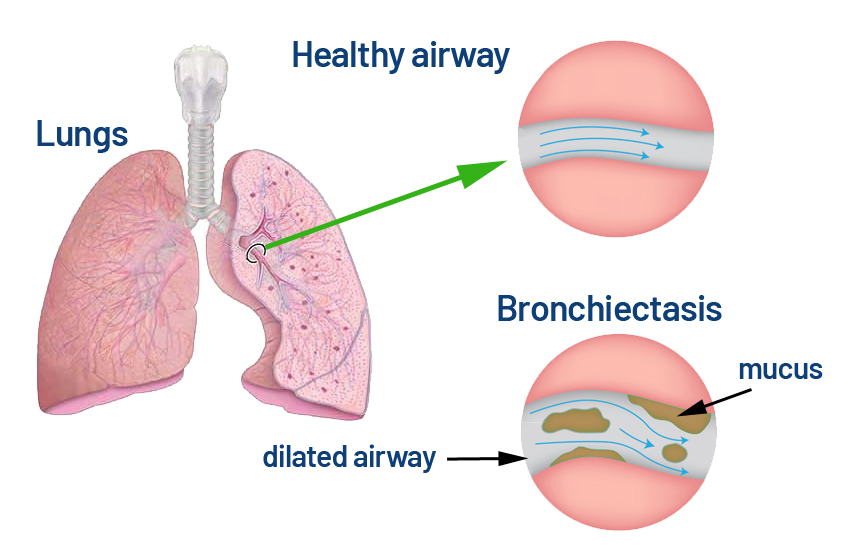
Bronchiectasis, a chronic condition characterized by the permanent widening of the bronchi in the lungs, leads to frequent infections, persistent coughing, and difficulty in breathing. While there is no cure for this condition, many sufferers are increasingly turning to Natural Treatment for Bronchiectasis to complement conventional therapies. Among these approaches, dietary supplements stand out as a powerful way to enhance lung health and support the immune system. We explore the must-have supplements for individuals with bronchiectasis and how they fit into broader natural remedies for bronchiectasis.
What is Bronchiectasis?
Bronchiectasis is a chronic lung condition that affects thousands of individuals worldwide, yet it remains under recognized and often misunderstood. This article will provide a detailed overview of bronchiectasis, covering its causes, symptoms, diagnosis, treatment options, and ways to manage the condition for a better quality of life.

Understanding Bronchiectasis
Before diving into supplements, it’s important to understand how bronchiectasis impacts lung function. In this condition, the walls of the airways become damaged, making them less efficient at clearing mucus. This creates a breeding ground for bacteria, leading to frequent lung infections. Over time, this cycle can weaken the lungs and reduce quality of life.
The term “bronchiectasis” comes from the Greek words bronchos (airway) and ektasis (expansion), directly describing the dilated airways seen in affected individuals.
How the Lungs Are Normally Structured
To fully understand bronchiectasis, it’s essential to grasp the basic anatomy of the lungs. The lungs contain a branching system of airways starting with the trachea (windpipe), which splits into the bronchi and then further subdivides into smaller bronchioles, ending in tiny air sacs called alveoli. These alveoli are where gas exchange takes place—oxygen is absorbed into the blood, and carbon dioxide is exhaled.
In bronchiectasis, the larger airways (bronchi) become damaged, resulting in:
- Loss of the ability to clear mucus effectively
- Chronic infection and inflammation
- Obstruction and airflow limitation
Causes of Bronchiectasis
Bronchiectasis can be caused by a variety of underlying conditions. In some cases, no clear cause is identified, which is termed idiopathic bronchiectasis. However, known causes include:
- Previous Infections
- Severe pneumonia, tuberculosis (TB), or whooping cough can damage the airways permanently.
- Cystic Fibrosis
- A major genetic cause of bronchiectasis, especially in children and young adults. In fact, cystic fibrosis-related bronchiectasis is often classified separately due to its distinct pathophysiology.
- Immunodeficiency
- People with weakened immune systems (either from disease or medication) are more prone to infections that can lead to bronchiectasis.
- Autoimmune Diseases
- Conditions like rheumatoid arthritis, systemic lupus erythematosus (SLE), and Sjogren’s syndrome can be associated with the development of bronchiectasis.
- Allergic Bronchopulmonary Aspergillosis (ABPA)
- This is an exaggerated immune response to the fungus Aspergillus, often seen in asthma or cystic fibrosis patients.
- Primary Ciliary Dyskinesia
- A rare inherited condition where the cilia (tiny hair-like structures that move mucus) do not function properly, leading to mucus buildup.
- Inhalation of Foreign Bodies or Toxic Fumes
- Aspiration of food or inhalation of harmful substances can result in localized damage to the bronchi.
Signs and Symptoms
Bronchiectasis symptoms can vary widely between individuals depending on the severity and extent of the disease. However, common signs include:
- Chronic Cough
- Often productive, meaning it brings up large amounts of thick mucus (sputum).
- Recurrent Respiratory Infections
- Frequent chest infections that require antibiotics.
- Shortness of Breath
- Particularly during physical activity or in more advanced stages.
- Wheezing and Chest Tightness
- Similar to asthma symptoms but more persistent.
- Fatigue and Weight Loss
- Ongoing inflammation and infection can take a toll on overall health.
- Clubbing
- Enlargement of the fingertips (digital clubbing) can occur in advanced cases.
Why Supplements Matter
Supplements can provide essential nutrients that may be lacking in the diet, boost immune function, reduce inflammation, and help in mucus clearance. They form an integral part of Natural Remedies for Bronchiectasis by supporting respiratory health and overall well-being without the side effects of pharmaceuticals.
When considering any supplement regimen, it’s essential to consult with a healthcare provider, especially if you’re already on prescribed medication.
Must-Have Supplements for Bronchiectasis Sufferers
1. N-Acetylcysteine (NAC)
NAC is one of the most recommended supplements for bronchiectasis sufferers. It works by breaking down mucus and making it easier to expel from the lungs. In addition, NAC boosts levels of glutathione, a powerful antioxidant that protects lung tissue from oxidative stress.
Benefits:
- Mucolytic action (loosens mucus)
- Antioxidant support
- Reduces frequency of infections
Dosage: Typically 600–1,200 mg daily, divided into two doses.
2. Omega-3 Fatty Acids
Found in fish oil and flaxseed oil, omega-3 fatty acids have potent anti-inflammatory properties. In bronchiectasis, chronic inflammation plays a significant role in lung damage, so reducing it is key to managing the condition naturally.
Benefits:
- Decreases lung inflammation
- Supports immune system
- Improves cardiovascular health (important for overall oxygen transport)
Dosage: 1,000–3,000 mg daily of EPA and DHA combined.
3. Vitamin D3
Vitamin D deficiency is common in people with chronic lung diseases, including bronchiectasis. Vitamin D3 plays a vital role in modulating the immune system and reducing the frequency of respiratory infections.
Benefits:
- Strengthens immune response
- Reduces inflammation
- Lowers infection risk
Dosage: 2,000–5,000 IU daily, depending on blood levels.
4. Quercetin
Quercetin is a bioflavonoid with natural antihistamine and anti-inflammatory properties. It can help reduce airway inflammation and may even assist in stabilizing mast cells, which play a role in immune responses.
Benefits:
- Reduces inflammation in airways
- Acts as an antioxidant
- May help control allergic triggers
Dosage: 500–1,000 mg daily
5. Magnesium
Magnesium supports muscle function, including the muscles involved in breathing. It also has mild bronchodilating properties, which can help ease breathing for bronchiectasis sufferers.
Benefits:
- Supports lung function
- Relaxes bronchial muscles
- Reduces muscle cramps and fatigue
Dosage: 300–500 mg daily
6. Probiotics
Gut health has a significant impact on overall immune health. Probiotics help balance the gut microbiota, which in turn can support immune function and reduce the risk of secondary infections in bronchiectasis.
Benefits:
- Strengthens immunity
- Improves digestion
- Reduces frequency of respiratory infections
Dosage: Look for multi-strain formulas with at least 10 billion CFUs.
7. Zinc
Zinc is a trace mineral that is essential for immune system performance. It helps fight off respiratory pathogens and speeds up recovery from infections.
Benefits:
- Enhances immune response
- Reduces duration of infections
- Antioxidant properties
Dosage: 15–30 mg daily (avoid long-term high doses without medical supervision)
8. Mullein Leaf Extract
Mullein is a traditional natural remedy often used in natural treatment for bronchiectasis due to its soothing effects on the respiratory system. It can help loosen mucus and reduce cough frequency.
Benefits:
- Soothes irritated lungs
- Expectorant (helps clear mucus)
- Natural anti-inflammatory
Dosage: 1–2 ml of tincture daily, or as directed on the product label.
9. Bromelain
Derived from pineapple, bromelain is an enzyme known for its anti-inflammatory and mucus-thinning properties. It can assist in clearing airways and improving breathing comfort.
Benefits:
- Reduces airway inflammation
- Breaks down mucus
- Improves absorption of other supplements
Dosage: 200–800 mg daily on an empty stomach
10. Cordyceps Mushroom
Cordyceps is a medicinal mushroom long used in Traditional Chinese Medicine to support respiratory function and boost energy. It may enhance oxygen uptake and reduce fatigue in chronic lung conditions.
Benefits:
- Improves lung capacity
- Boosts energy and stamina
- Enhances immunity
Dosage: 1,000–3,000 mg daily in capsule or powder form
Integrating Supplements with Lifestyle Changes
While supplements are a cornerstone of natural treatment for bronchiectasis, they are most effective when paired with supportive lifestyle changes:
1. Breathing Exercises
Techniques such as pursed-lip breathing, diaphragmatic breathing, and airway clearance exercises can enhance the lungs’ ability to expel mucus.
2. Hydration
Drinking plenty of water thins mucus, making it easier to clear from the lungs. Herbal teas like ginger, licorice root, and thyme can offer additional respiratory support.
3. Anti-Inflammatory Diet
Eating a diet rich in fruits, vegetables, fatty fish, nuts, and whole grains can help reduce inflammation and provide essential nutrients naturally.
4. Regular Physical Activity
Even light exercise like walking or tai chi can improve lung capacity and circulation, essential for oxygen delivery.
Cautions and Considerations
While natural remedies for bronchiectasis are generally safe, it’s important to:
- Consult a healthcare provider before starting any new supplement, especially if you are on medication or have other health conditions.
- Monitor for side effects, particularly with higher doses or prolonged use.
- Choose high-quality supplements from reputable brands to ensure purity and potency.
- Avoid mega-dosing, unless specifically advised by a healthcare provider.
Conclusion: Empower Your Lungs Naturally
Living with bronchiectasis can be challenging, but you don’t have to face it with pharmaceuticals alone. Integrating key supplements into your daily routine can significantly enhance lung function, reduce inflammation, and prevent infections. When used wisely, these nutrients become a powerful part of your natural treatment for bronchiectasis plan.
By focusing on anti-inflammatory support, mucus clearance, and immune strength, these supplements not only help manage symptoms but also promote overall well-being. Combined with other natural remedies for bronchiectasis, they can empower you to take control of your lung health and live a fuller, more active life. Herbs Solutions By Nature can be very helpful in bronchiectasis.